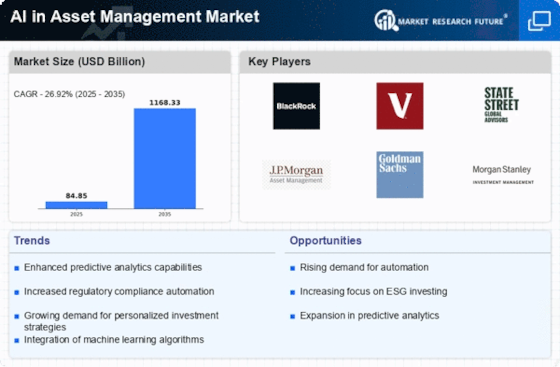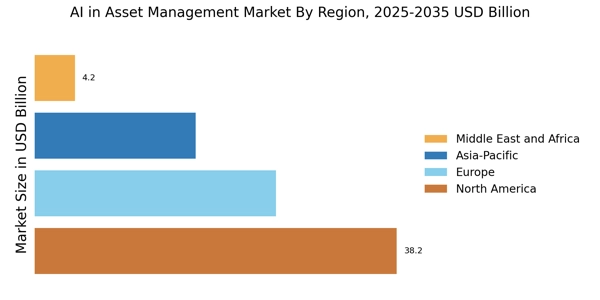Increased Demand for Automation
The AI in Asset Management Market experiences a notable surge in demand for automation solutions. As firms strive to enhance operational efficiency, the integration of AI technologies facilitates the automation of routine tasks, thereby allowing asset managers to focus on strategic decision-making. According to recent estimates, the automation of investment processes could potentially reduce operational costs by up to 30%. This trend is particularly pronounced among firms managing large volumes of transactions, where the efficiency gains from AI-driven automation are most apparent. Consequently, the drive towards automation is reshaping the competitive landscape, compelling firms to adopt AI solutions to remain relevant and efficient in a rapidly evolving market.
Enhanced Risk Management Capabilities
In the AI in Asset Management Market, enhanced risk management capabilities emerge as a critical driver. AI technologies enable asset managers to analyze vast datasets, identifying potential risks and market anomalies with unprecedented accuracy. This capability is particularly vital in volatile market conditions, where traditional risk assessment methods may fall short. By leveraging machine learning algorithms, firms can develop predictive models that assess risk exposure in real-time, thereby improving decision-making processes. Reports indicate that firms utilizing AI for risk management have seen a reduction in portfolio volatility by approximately 20%. This enhanced risk management not only protects assets but also instills greater confidence among investors, further driving the adoption of AI solutions.
Growing Importance of Data-Driven Insights
The AI in Asset Management Market is significantly influenced by the growing importance of data-driven insights. As the volume of available financial data continues to expand, asset managers increasingly rely on AI technologies to extract actionable insights from this data. The ability to analyze historical trends, market sentiment, and economic indicators allows firms to make informed investment decisions. Recent studies suggest that firms employing AI-driven analytics have improved their investment performance by an average of 15% compared to those relying solely on traditional methods. This reliance on data-driven insights not only enhances investment strategies but also fosters a culture of innovation within asset management firms, further propelling the adoption of AI technologies.
Regulatory Compliance and Reporting Efficiency
Regulatory compliance remains a paramount concern within the AI in Asset Management Market. The increasing complexity of regulatory requirements necessitates the adoption of AI solutions to streamline compliance processes. AI technologies can automate the monitoring and reporting of compliance-related activities, significantly reducing the time and resources required for these tasks. Firms that implement AI-driven compliance solutions report a decrease in compliance-related costs by as much as 25%. Furthermore, the ability to quickly adapt to changing regulations enhances a firm's agility and responsiveness, positioning them favorably in a competitive landscape. As regulatory scrutiny intensifies, the integration of AI for compliance purposes is likely to become a standard practice in the asset management sector.
Shift Towards Sustainable Investment Strategies
The AI in Asset Management Market is witnessing a shift towards sustainable investment strategies, driven by increasing investor demand for Environmental, Social, and Governance (ESG) considerations. AI technologies facilitate the analysis of ESG data, enabling asset managers to identify sustainable investment opportunities more effectively. This trend is underscored by a growing body of evidence suggesting that companies with strong ESG practices tend to outperform their peers in the long run. As a result, asset managers are increasingly incorporating AI-driven ESG analytics into their investment processes. Reports indicate that the integration of AI in ESG analysis has led to a 10% increase in the identification of high-performing sustainable assets. This shift not only aligns with investor preferences but also enhances the overall resilience of investment portfolios.


















